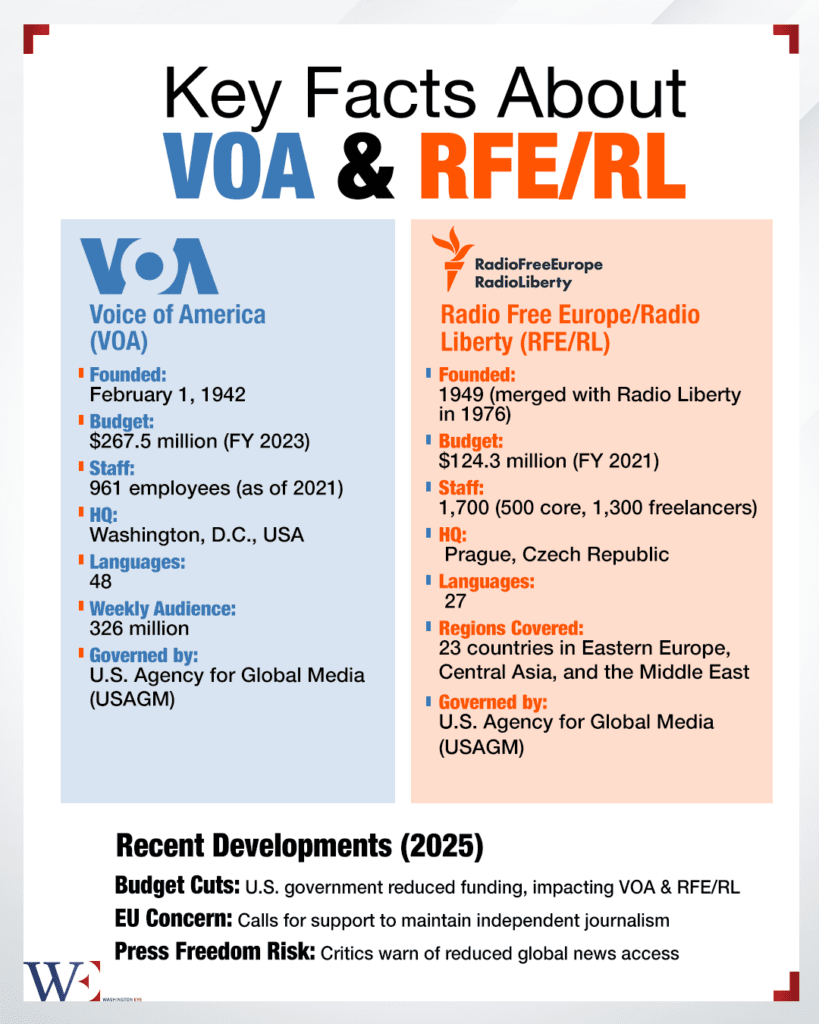In a move that has sparked widespread concern among media freedom advocates, the Trump administration has announced the termination of funding for several U.S.-backed media organizations, including the Middle East Broadcasting Networks (MBN), Voice of America (VOA), Radio Free Europe/Radio Liberty (RFE/RL), and Radio Free Asia (RFA). This decision effectively halts the operations of media entities that have played a crucial role in promoting independent journalism in authoritarian regimes and regions with restricted press freedom.
End of U.S. Support for Middle East Broadcasting Networks
The MBN, which operates Alhurra TV, Radio Sawa, and several digital news platforms such as Maghreb Voices, has long served as a key instrument of U.S. public diplomacy in the Arabic-speaking world. Founded in 2004 as a counterweight to anti-American sentiment following the Iraq invasion, the network was designed to provide balanced reporting on global and regional affairs.
With an annual budget of approximately $106.59 million, MBN was one of the most well-funded divisions under the U.S. Agency for Global Media (USAGM). However, Trump administration officials, including USAGM senior adviser Kari Lake, deemed the networks “no longer worth funding,” arguing that their impact had waned over the years.
Critics, however, argue that the removal of MBN funding represents a step backward in the battle for truthful and independent reporting in the Middle East. “Shutting down Alhurra means closing off an avenue for factual news in a region where misinformation is rampant,” said a former MBN executive, emphasizing the potential consequences of the decision.
Voice of America and Other U.S.-Funded Media Face Uncertain Future
Voice of America, one of the most recognized and long-standing international broadcasters, has also been hit by the funding freeze. Established during World War II, VOA broadcasts in nearly 50 languages and has been instrumental in delivering news to audiences in politically restricted environments. The decision has led to immediate disruptions, with VOA employees being placed on paid administrative leave while further operational decisions are made.
Other affected outlets include RFE/RL and RFA, both of which have provided vital coverage in countries with strict government control over the media. RFA, in particular, has been crucial in reporting on issues in China, North Korea, and Myanmar, often delivering information censored by state-run outlets. Without U.S. funding, RFA is expected to lay off most of its approximately 300 U.S.-based staff members, severely limiting its ability to continue reporting in high-risk environments.
Executive Order and Policy Justification
The decision to defund these media organizations is rooted in an executive order signed by President Trump titled “Continuing the Reduction of the Federal Bureaucracy.” The order seeks to minimize the functions of various agencies, including the USAGM, which oversees these international broadcasters. According to administration officials, the cuts are part of a broader effort to streamline government expenditures and eliminate programs deemed ineffective or outdated.
However, this justification has been met with sharp criticism from lawmakers and media professionals alike. “These outlets serve as the last line of defense against state-controlled propaganda in some of the world’s most repressive countries,” said Stephen Capus, President and CEO of RFE/RL. “Eliminating them is a massive gift to America’s adversaries”.
International Concerns and the Future of U.S. Public Diplomacy
The global reaction to these cuts has been largely negative, with many observers warning that the absence of these media outlets will leave an information void in regions plagued by censorship. The European Union is currently discussing potential measures to support RFE/RL, recognizing its historical role in countering authoritarian narratives, particularly during the Cold War.
Despite these efforts, finding alternative funding sources remains a formidable challenge. Organizations like VOA, RFA, and MBN have operated primarily on U.S. government grants, and their future without federal support remains uncertain. The shutdown also raises concerns about the safety of journalists working in authoritarian states. Without the institutional backing of these media organizations, reporters could face heightened risks of arrest, harassment, or violence.
A Final Note: A Shift in U.S. Media Strategy?
The Trump administration’s decision to cut funding for international media outlets represents a significant shift in U.S. public diplomacy and its approach to global information dissemination. While proponents argue that these outlets have lost their effectiveness, critics contend that their removal will embolden authoritarian regimes and limit access to independent journalism.
As the dust settles, questions remain about the long-term impact of these cuts. Will international partners step in to fill the funding gap, or will these media organizations disappear altogether? And how will this decision shape the global perception of America’s commitment to press freedom and democratic values? Regardless of the outcome, the decision marks a turning point in how the U.S. engages with the world through media.















